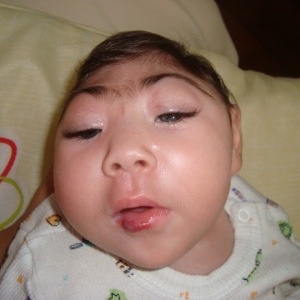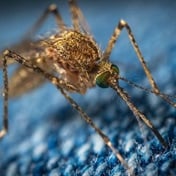
The thousands of babies born in Brazil with abnormally small heads and brains, believed to be caused by infection in the womb with the Zika virus, typically face a lifetime of health challenges, doctors say. But not all are destined to a life of medical woes.
No cure for microcephaly
The Brazilian babies – who may number more than 4,000 – have the condition known as microcephaly. And in 85 percent to 90 percent of microcephaly cases, infants also suffer from stunted brain development, said Dr Edward McCabe, senior vice president and medical director of the March of Dimes.
The severity of developmental disability depends largely on how badly the Zika virus has stunted brain growth, said Dr Ausim Azizi, chairman of neurology at Temple University's Lewis Katz School of Medicine in Philadelphia.
Read: Don't be fool by 'mild' Zika virus
"If the brain is really, really small, it's more likely the child will have severe disability," Azizi said. "If the brain is moderately small, the child likely will have less disability."
There is no cure for microcephaly. Most children born with the birth defect will struggle their entire lives, and some may require life-long care, said Michelle Kelly, a paediatric and neonatal nurse practitioner and an assistant professor at Villanova University in Pennsylvania.
"Affected children will require early developmental intervention, physical therapy, speech therapy, occupational therapy, as well as daily medications to control seizures and other neuromuscular conditions," Kelly said.
And while it's yet to be proven that the mosquito-borne Zika virus is to blame for the wave of birth defects in Brazil, the pathogen appears to represent a public health emergency "with the potential to devastate the child, the family, and overwhelm the health and educational resources of communities worldwide", Kelly concluded.
Read: Microcephaly: Zika virus highlights birth defect
From what researchers can tell so far about Brazil's microcephaly epidemic that began last spring, pregnant women in their first trimester appear to be at greatest risk from the Zika virus. First identified in Uganda in 1947, the virus only seems to pose a health threat to a pregnant woman and her foetus.
Rare birth defect in US
But in a curious twist, government leaders in Colombia reported over the weekend that, while there have been roughly 3,000 cases of Zika infection in pregnant women in that country, there's no evidence that the virus has caused any birth defects.
In the United States, microcephaly is a rare birth defect, affecting between two to 12 babies out of every 10,000 live births, according to the U.S. Centres for Disease Control and Prevention.
Viral infections other than Zika have previously been linked to microcephaly. Babies exposed to chickenpox, measles, toxoplasmosis or cytomegalovirus in the womb also are at risk for developing the birth defect, said Dr Lisa Emrick, a paediatric neurologist with Texas Children's Hospital in Houston.
Read: Zika virus: 14 things you need to know
Genetics can also play a role in microcephaly. Babies exposed to alcohol, drugs, chemicals and even lead in the womb also have an increased risk of microcephaly, according to the March of Dimes.
In addition to mental and developmental disabilities, children born with microcephaly can suffer from seizures or cerebral palsy and not be able to properly control their muscles, Emrick said. Some babies with microcephaly may also experience hearing or vision loss, according to the CDC.
These disabilities occur along a range, however, and McCabe noted that in 10 percent to 15 percent of cases, babies born with microcephaly will suffer no problems at all.
Daily medications
"By definition, they'll have microcephaly, but they'll have completely normal development," McCabe said, adding that it's not necessarily a birth defect for every baby who has it.
Experts stress that rehabilitation is the only real treatment for microcephaly. The earlier a child is given therapy to address his or her specific deficiencies, the better, McCabe said.
Read: Will the Zika virus spread to SA?
"It's not something the baby is going to grow out of," he said. "Putting it off and hoping the baby will grow out of it is not an appropriate approach."
Beyond therapy, children also might need daily medications to help control their seizures, or help them gain more control of their arms and legs, Emrick said.
Microcephaly can be detected in the womb, using ultrasound or foetal MRI scans during the second or third trimester, Emrick said.
When microcephaly is caused by a virus, doctors can try to limit the damage by treating a mother with antiviral drugs.
"There are potential treatments you can give the mother to help decrease the viral load," Emrick said, although she added this type of preventive therapy is still experimental.
Significant developmental delays
If apparent brain damage is too significant, some families may consider abortion, Azizi and Emrick said.
"It's very hard and it's very difficult for families," Emrick said. "It's the most difficult conversation you can have with a person, that your normal pregnancy is not normal."
Read: Europe creates Zika 'task force'
Kelly added: "Regardless of the cause, children with microcephaly have significant developmental delays and cognitive impairment. They will require significant support through childhood, starting with early developmental intervention services. The implications of a generation of children whose mothers are affected by the Zika virus are overwhelming to families, to communities and to the larger global community."
Because of microcephaly's potentially devastating consequences, U.S. health officials are urging pregnant women to avoid travel to more than 30 countries and territories affected by the Zika virus and to refrain from sex or use a condom if their partner has travelled to, or lives in an area where Zika infection is active. Those hot zones are located throughout Central and South America and the Caribbean.
Read more:
Hotter conditions allow Zika mosquito to flourish




 Publications
Publications
 Partners
Partners















